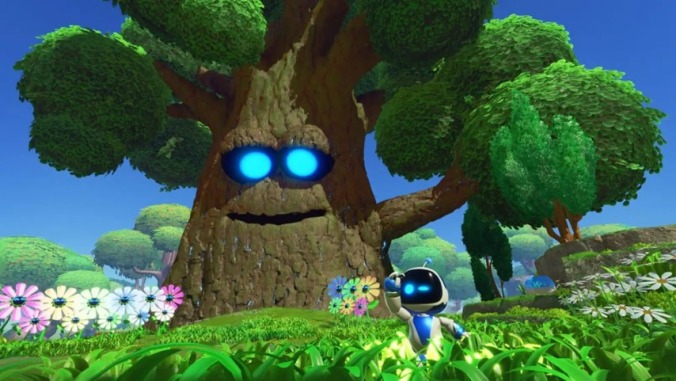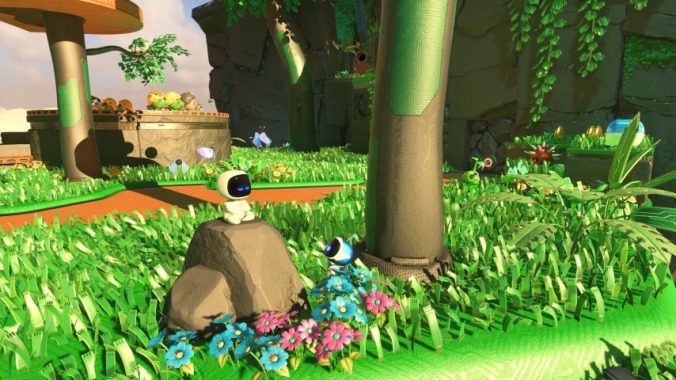The world agrees: Astro Bot is great. Paste loves it, critics love it, players love it: everybody loves it, and for good reason. It’s an adorable, smartly designed game that’s challenging but hardly ever backbreaking, and a thoroughly modern platformer that still squeezes in copious retro hat-tips and nostalgic nods without ever feeling hoary or hidebound. The ecstatic response is justified and deserved, but so effusive and seemingly surprised that it has me asking one question: did nobody play Astro’s Playroom, or something?
So much of the praise for Astro Bot seems to view it as an unlikely, unexpected treat—an out-of-the-box hit in a genre that, outside of Nintendo, has felt niche for decades. That’s also how a lot of people reacted to Astro’s Playroom, the amazing Astro Bot platformer that came out in 2020 as a pack-in game at the PlayStation 5’s launch. Astro’s Playroom wasn’t one of the more hyped PlayStation 5 launch games, but it was the best, and is still one of the very best games on the system. It’s at least as great as Astro Bot, and maybe greater, with better music and a leaner, more succinct structure. And literally anybody who owns a PlayStation 5 has a copy of it. So why does it feel forgotten or overlooked amid the tidal wave of hype for its sequel?
Part of it has to be the nature of console launches. Yes, Astro’s Playroom came with every unit of the PlayStation 5, but right out of the gate it was competing for attention with fellow launch titles like the Demon’s Souls remake, the 4K upgrades of Sony’s first two Spider-Man games, and even another platformer, the then-higher profile Little Big Planet spinoff Sackboy: A Big Adventure. And that’s only the first-party launch games; there were over a dozen other games released or upgraded for the PS5 that day, covering some of the biggest franchises in games. If you were a games critic when the system came out, or a consumer who dropped several hundred dollars for a new console and some games, odds are you weren’t immediately diving into the offbeat little pack-in sequel to a moderately successful VR-only game.

Astro Bot
Astro Bot had far less direct competition to deal with when it came out earlier this month. NBA2K25 was the only other major title released the same week, and as popular as the major sports games are, they rarely find themselves at the center of online games discourse or as a go-to game for streamers and tubers. And with September remaining slow until The Legend of Zelda: Echoes of Wisdom comes out the last week of the month, Astro Bot could very well continue to be the center of attention. Don’t count this kind of thing out: even though almost everybody who played Astro’s Playroom in November 2020 seemed to love it, it’s not easy for word-of-mouth to break through whatever marketing buzz and promotional hype are currently driving the conversation.
Astro Bot’s more explicit reliance on nostalgia and Easter eggs has also played a part in the game’s increased visibility. This was a part of Astro’s Playroom—it had bots dressed up like characters from other PlayStation games, and you collected various PlayStation hardware from throughout the decades—but it wasn’t as central or defining as it is with Astro Bot. Astro Bot doesn’t just have background characters dressed like Nathan Drake or Kratos; you rescue these kinds of bots throughout the game, and the last planet of each solar system turns another Sony franchise into an Astro Bot level, with those Drake and Kratos bots becoming playable characters. Yes, it’s cute, and some of the ways in which Astro Bot adapts those other games into its own style and language are ingenious, but it’s a little shameless and far more in-your-face about it than Playroom’s playful references. It seems this more overt approach to corporate synergy appeals to Sony’s audience during this IP-obsessed era, though.
That all might explain why Astro Bot has gotten more attention and praise than Astro’s Playroom, but it doesn’t really account for the sense of surprise that runs through so much Astro Bot coverage. Astro Bot shouldn’t be a revelation to anybody who played Playroom, and yet that’s exactly how so many people are treating it. You pretty much expect a larger, longer first sequel to a great game to get better reviews, given how games have always touted their size and scope, and how it usually takes a few installments before people catch up to and start to tire of a new series. But so much of the tone and tenor of Astro Bot’s love seems to dismiss or downplay Astro’s Playroom, or even unaware that it exists. And given that there’s a strong argument to be made that Playroom is the better game, its lack of recognition isn’t just weird: it’s wrong.
Senior editor Garrett Martin writes about videogames, comedy, travel, theme parks, wrestling, and more. He’s also on Twitter @grmartin.

